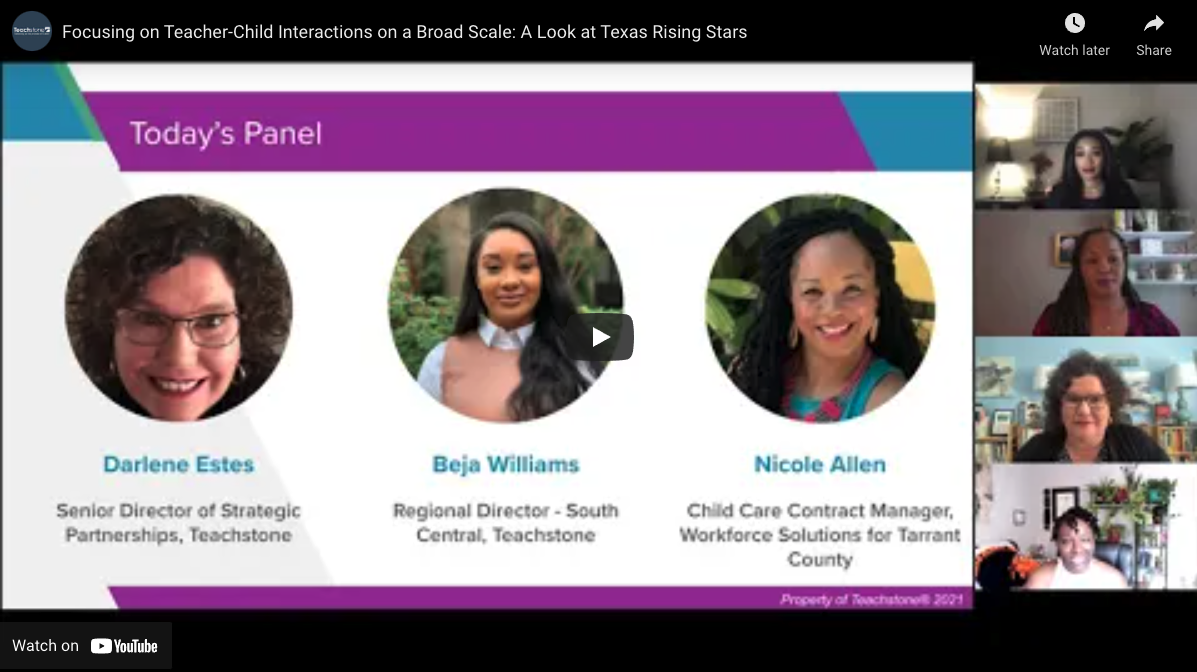
“There’s been a positive wave of changes across the great state of Texas,” concluded Beja Williams, regional director at Teachstone, during Teachstone’s recent webinar, Focusing on Teacher-Child Interactions at Scale: A Look at Texas Rising Stars. “And, we are buckling up for a fun ride.”
Beja joined Darlene Estes, Teachstone’s senior director of strategic partnerships, and Nicole Allen, Child Care Contract Manager, Workforce Solutions for Tarrant County, Texas to talk about the latest changes improving the quality of education across Texas.
Darlene opened the webinar by explaining how Quality Rating and Improvement Systems (QRIS) are one way that states promote quality across their early childhood education system. QRIS vary by state, but often improvement supports like coaching programs and professional development. Those improvements focus on the factors that states consider to be key indicators of quality, such as licensing and accreditation, teacher-child interactions, or environmental factors.
QRIS provides a way to define and measure quality, and also makes a systematic approach that early learning programs can use to move forward in their quality improvement. When the concept of QRIS were first popularized, they were focused on accountability purely focused on assessments that created benchmarks.
At the end of the day, children deserve what’s best. And, educators deserve the best support to make that happen.
- Darlene Estes
Today, more QRIS have shifted to a model that empowers teachers and gives them agency over their own assessment data. The data is still being used to create benchmarks, but also supports a stronger personal quality improvement journey among educators. Before taking a closer look at how Tarrant County is supporting their early childhood workforce, let’s dig into the recent changes in Texas’ QRIS.
A Look at Texas
Texas Rising Star is a voluntary quality rating and improvement system (QRIS) for child care providers taking part in the Texas Workforce Commission’s (TWC) subsidized child care program. Texas Rising Star certification is available to licensed centers and licensed and registered family child care home facilities that meet the certification criteria.
TRS includes three levels of quality certification to encourage child care and early learning programs to attain progressively higher levels of quality. These levels are tied to reimbursement rates for children receiving subsidies.
Every 4-5 years a workgroup is assembled to review Texas Rising Star and make improvements. With support from TWC, the workgroup leads an expansive and collaborative review of the program with stakeholders from across the state.
In June 2021, Texas Rising Star increased the category focused on Teacher-Child Interactions from 20% to 40%—a significant increase. This section of the assessment tool examines:
-
-
- Classroom ratios
- Warm and responsive style
- Facilitated language and support
- Play-based interactions and guidance
- Support for childrens regulation
- Instructional formats and approaches to learning.
-
Teachstone celebrates Texas’ shift toward focusing on what matters most — meaningful interactions between children and teachers. One workforce board in north Texas has seen first-hand that high-quality interactions lead to high-quality learning outcomes for children.
Case Study: How Tarrant County Uses CLASS® as an Additional Resource
Tarrant County uses CLASS as a tool to help mentor and support child care centers and family child care homes in their community. Nicole Allen, ChildCare Contract Manager in Tarrant County, shared about their CLASS journey—from implementation to outcomes.
We were trying to figure out how to create a system in Tarrant County that aligned all our of early childhood programs...CLASS, to us, seemed like a natural progression into how we were going to elevate quality in our centers while working in partnership with our programs to ensure that each one of us are speaking the same language, using the same tool, and then providing the same professional development across all our early learning programs.
- Nicole Allen
Their CLASS journey began in 2018 when about 50 partners came together regularly to lean on each other for goal-setting and alignment. Members included local Head Start, nonprofits, Fort Worth Independent School District, and others. Together, they created a shared-services model that served the providers across the region, and it was then that the group decided to use CLASS as the basis of their ongoing professional development.
In 2020, Tarrant County partnered with Southern Methodist University (SMU), who observed 552 classrooms across the region and gave professional development to 36 programs. And even though they were bringing in these outside observers, they also trained all their mentors on CLASS so that they understood the tool and had the same shared definition across the board. To create even further buy-in, they ensured that their process for assessing and coaching was transparent to all—teachers, directors, mentors, and observers all had clarity on the process and knew what to expect and when.
We CQI’d the heck out of this thing. Every single time there was an issue or a hiccup, we’d step back. We all got around the table and talked about what was working and what wasn’t working.
- Nicole Allen
The mentors met with each other in professional learning communities (PLCs) to learn from each other and discuss how they were going to turn the CLASS scores into action plans. One mentor, Grace Peninger, shared her perspective on how CLASS empowered the teachers she worked with, “The individualized scores were really helpful when working with teachers and planning. We were able to use the data to make informed goals. And the teachers were especially excited and motivated when seeing their growth after the spring observations.”
If you’re looking to implement CLASS as a part of your continuous quality improvement process, Nicole offers the following advice:
-
-
- Don’t be scared of it. CLASS is all of the things you already know to do and are doing.
- Remember that CLASS is one tool in your toolbox. And, it’s one that can be used alongside other methods and strategies you’re doing in your program.
- Explain the why. Why are you adding this new tool? Ultimately, it benefits the children.
-
Want to watch the full webinar? Access it here.

